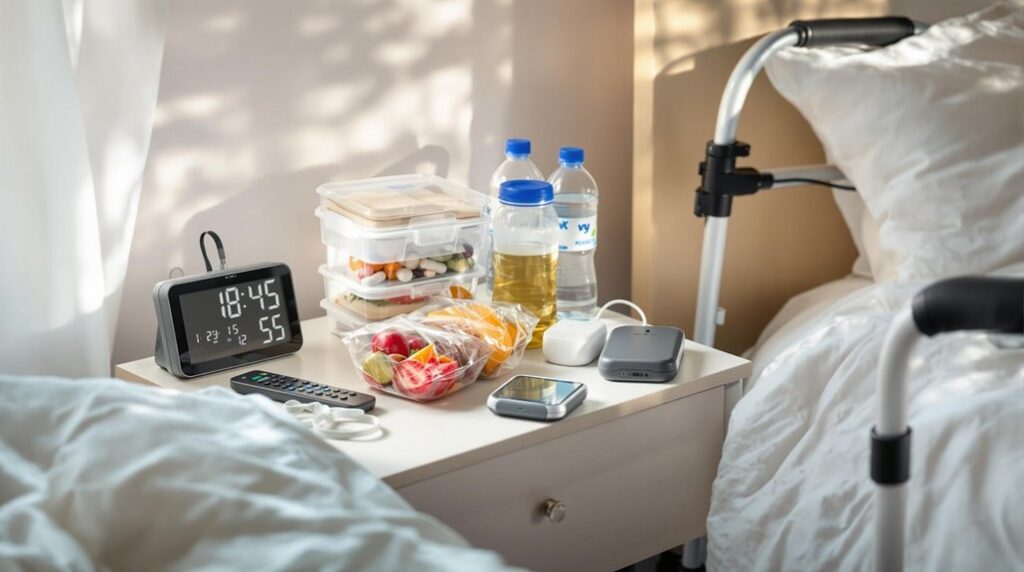If you don’t have someone to care for you after surgery, you’ll need to create a thorough recovery plan. Start by discussing your situation with your healthcare team and exploring professional home health care options. Set up your living space with a recovery station, prepare meals in advance, and arrange transportation for follow-up appointments. You can also tap into community resources, meal delivery services, and remote monitoring solutions. With proper planning and the right support systems, you’ll discover multiple ways to guarantee a safe recovery.
Assessing Your Post-Surgery Care Needs
Before heading home from surgery without a caregiver, you’ll need to understand exactly what your recovery demands. Start by requesting a detailed post-surgery assessment from your healthcare team. Ask specific questions about your limitations, including how long you’ll need assistance with daily tasks and when you can resume normal activities.
Understanding your post-surgery limitations and recovery needs is crucial when planning to recover without a caregiver’s support.
Make an extensive list of your recovery needs, focusing on essential activities like medication management, wound care, and personal hygiene.
Consider your mobility restrictions and how they’ll affect your ability to prepare meals, use the bathroom, or climb stairs. Don’t forget to evaluate your living space – you may need to temporarily reorganize furniture or create a recovery station with necessities within easy reach.
Being thorough in this assessment will help you develop an effective self-care strategy and identify areas where you’ll need additional support.
Professional caregivers can provide post-surgical recovery care including pain management assistance and specialized wound care to minimize complications during your healing process.
Professional Home Health Care Options
When recovery without a caregiver feels overwhelming, professional home health services can fill essential care gaps. You can hire skilled nurses or certified nursing assistants through licensed home health agencies to assist with wound care, medication management, and crucial sign monitoring.
Professional caregiver services also provide help with daily activities like bathing, dressing, meal preparation, and light housekeeping. Many agencies offer flexible scheduling options, from a few hours daily to round-the-clock care, based on your specific needs and budget.
To find reliable providers, contact your hospital’s discharge planning department, local senior centers, or your insurance company for recommendations.
Medicare and private insurance often cover home health care when prescribed by your doctor, making it a practical solution for post-surgery recovery when you’re on your own.
Medical social services can connect you to valuable community resources while providing essential emotional support during your recovery period.
Arranging Transportation and Logistics
Since you’ll need reliable transportation after surgery, planning your travel arrangements in advance is essential. Research available transportation services in your area, including medical transport companies, rideshare services with accessibility options, and non-emergency medical transportation providers.
| Service Type | Best For | Cost Range |
|---|---|---|
| Medical Transport | Limited Mobility | $50-150/trip |
| Rideshare | Basic Transport | $15-40/trip |
| Volunteer Services | Budget-Friendly | Free-$25/trip |
| Taxi Services | Flexible Schedule | $30-80/trip |
| Medical Van | Equipment Transport | $75-200/trip |
Create a detailed logistics planning schedule that includes post-op appointments, pharmacy visits, and follow-up care. Keep important phone numbers readily accessible, and consider scheduling rides at least 48 hours in advance. Remember to factor in extra time for slower movement and potential waiting periods during your recovery. For comprehensive support during recovery, consider arranging skilled home care services which can provide professional assistance with post-surgical care and rehabilitation needs.
Setting Up Your Home for Recovery
While transportation planning guarantees you can get home safely, preparing your living space for recovery is your next key step. Before surgery, focus on home organization that supports independent living during your healing period.
Set up a dedicated recovery station with essentials within arm’s reach, including medications, water, snacks, phone charger, and entertainment items.
Create clear pathways throughout your home by removing obstacles and securing loose rugs. Stock your kitchen with easy-to-prepare meals and position frequently used items at waist level to avoid stretching or bending.
Place recovery essentials like bandages, ice packs, and prescribed medical supplies in easily accessible locations. Consider temporary adjustments like relocating your sleeping area to avoid stairs, and install nightlights to prevent falls during nighttime bathroom visits.
Skilled nursing care can provide expert wound monitoring and dressing changes if you’re concerned about managing post-surgical care alone.
Meal Planning and Delivery Services
Because proper nutrition plays an essential role in post-surgical healing, you’ll need a solid meal plan before your operation. Start by preparing and freezing several portions of nutrient-rich meals that you can easily reheat. Focus on protein-rich foods, vegetables, and whole grains to support your recovery.
Consider signing up for meal delivery services that can bring fresh, ready-to-eat meals to your doorstep. Many companies offer specialized meal plans for post-surgery patients, accommodating dietary restrictions and nutritional needs.
If cost is a concern, explore local community services or religious organizations that provide meal assistance to recovering patients.
Stock your kitchen with healthy snacks, prepared fruits, and easily accessible drinks. Place these items at counter height to avoid stretching or bending.
Remember to keep a water bottle within reach to stay hydrated throughout your recovery.
For those who qualify, Medicaid home health services can provide additional support with meal preparation and feeding assistance during your recovery period.
Remote Monitoring and Telehealth Solutions
Modern telehealth options have transformed post-surgical care for patients without caregivers. You can now stay connected to your healthcare team through remote health monitoring devices and smartphone apps that track your essential signs, medication schedule, and recovery progress.
Take advantage of virtual check-ins with your doctor, which allow them to assess your healing, adjust medications, and address concerns without you leaving home. Many healthcare providers offer video consultations where you can show them your incision site or demonstrate your range of motion.
Virtual consultations let doctors monitor your recovery, adjust care, and evaluate healing progress while you rest comfortably at home.
Consider using wearable devices that automatically alert your medical team if your essential signs indicate potential complications. These technologies provide peace of mind when recovering alone and guarantee quick intervention if needed.
Your doctor can recommend specific remote monitoring tools suited to your surgery type and recovery needs.
Building a Support Network in Your Community
Even if you don’t have a live-in caregiver, you can build a reliable support system within your community for post-surgery assistance. Through community outreach and local resources, you’ll find many people and organizations willing to help during your recovery period.
Start by reaching out to different groups and individuals who can provide various types of support.
- Contact faith-based organizations, community centers, or senior centers that offer volunteer assistance programs.
- Join local support groups or online communities specific to your medical condition to connect with others who’ve had similar surgeries.
- Reach out to neighborhood associations or community bulletin boards to find reliable helpers for specific tasks.
- Connect with local resources like meal delivery services, transportation assistance programs, or home health aide agencies that offer sliding-scale fees.
Financial Resources and Insurance Coverage
While recovering from surgery without a caregiver can be challenging, understanding your financial options and insurance coverage will help manage costs effectively.
Start by reviewing your health insurance policy to identify coverage for post-surgical care, including home health services and medical equipment. Many insurance plans cover visiting nurses or part-time caregivers.
Contact your hospital’s financial counseling department to explore financial assistance programs if you’re struggling with medical bills. Some hospitals offer sliding-scale payments or charity care.
You might also qualify for government assistance through Medicare or Medicaid. Consider reaching out to nonprofit organizations and foundations that provide grants for medical expenses.
If you belong to a religious congregation or community organization, inquire about emergency financial support programs they may offer for healthcare needs.
Emergency Plans and Safety Measures
Creating a solid emergency plan is essential when recovering from surgery alone.
Prioritize your safety by preparing a detailed safety checklist and keeping emergency contacts within easy reach. Store important phone numbers on speed dial and place a fully charged phone near your recovery area.
Keep your safety front and center by maintaining emergency contacts and a detailed recovery checklist within easy reach at all times.
- Post a list of emergency contacts on your refrigerator and bedroom door, including your doctor, pharmacy, and trusted neighbors.
- Create a safety checklist that includes daily medication schedules, warning signs to watch for, and when to call for help.
- Place necessary items like water, medications, and a first-aid kit within arm’s reach of your bed or recovery area.
- Install a medical alert system or use a smartphone app that can call for help with one touch if you experience complications.
Conclusion
Recovering from surgery by yourself may feel scary, but you have more options than you might think. Picture having a team of caring professionals checking on you, bringing meals, and helping you heal safely at home. Just like a trusted friend who’s there when you need them, services like home health care and community programs can provide the support you need. Your doctors and nurses want to see you get better, and they’ll work with you to create a simple recovery plan that makes sense for your life.
Remember, you’re not walking this path alone. Focus Family Care understands what you’re going through and is ready to be your helping hand during recovery. We treat each client like family, making sure you have everything you need to heal comfortably and safely.
If you or a loved one need help, don’t wait. Reach out to Focus Family Care today at (561) 693-1311 or email us at info@focusfamilycare.com.





